Kenyan journalists assumed senior politicians from the ruling party and opposition would be singled out for inciting the public to kill after the 2007 presidential elections–but they were shocked to find out that one of their own has been named.
Last week, International Criminal Court (ICC) Chief Prosecutor Luis Moreno-Ocampo released a list of six suspects wanted by The Hague for their role in instigating Kenya’s 2007 post-election violence that included the director of a small, vernacular radio station in western Kenya. Moreno-Ocampo asked for the six to be issued “summonses to appear” at the court. The ICC announced that the court would now determine whether “there are reasonable grounds to believe that the six persons named committed the alleged crimes” and then “decide on the most appropriate way to ensure their appearance.”
Joshua Arap Sang, the head of the Kalenjin-language radio station, Kass FM in Rift Valley, western Kenya, presented a morning show, “Lene emet” (What Is the World Saying). According to the ICC, Sang was a prominent supporter of the opposition party under Raila Odinga and used his station to “collect supporters and provide signals to members of the plan on when and where to attack.” After the public accused incumbent President Mwai Kibaki and his supporters of election rigging, the ICC alleges a plan was put in place in the Rift Valley to attack Kibaki’s supporters. The ICC prosecutor said police and those supporters then retaliated in a similarly violent manner.
The violence killed some 1,200 people in early 2008. Peace was eventually brokered, with a power-sharing deal between Kibaki and rival Odinga, and an agreement that the perpetrators of the violence would face justice in Kenya or at The Hague. Despite recent efforts by certain politicians to derail the process, Sang is expected to face charges for murder, deportation, persecutions, and torture.
Sang said he was surprised to be included among the suspects, the Daily Nation reported on December 16. “As a matter of fact I went on air to request my listeners to be calm and embrace peace during the time when violence had engulfed the country,” Sang told the paper.
But a United Nations Development Programme study of the media’s performance over the post-election violence concluded that vernacular stations, including Kass FM, made inflammatory statements. The study cited cases of Kass FM making negative comments about other ethnic groups whom they accused of stealing and occupying their traditional homeland in the Rift Valley. On one occasion, the study reported, a caller emphasized the need to “get rid of weeds”–a chilling metaphor reminiscent of Rwanda’s Radio Mille Collines, which called on the public to “cut the trees down,” inciting Hutus to kill their Tutsi neighbors.
Kass FM, however, was not the only station singled out for inciting ethnic violence in the study. Others included the Kikuyu-language stations Inooro and Kameme FM and the Luo station Lake Victoria. The difference was in the intensity of the speech, University of Nairobi journalism lecturer George Nyabuga said. Some of the worst scenes of ethnic violence took place near the station in Eldoret, in western Kenya, Nyabuga said, including an episode where Kenyans were burned alive inside a local church.
While most local journalists CPJ spoke to support the ICC’s decision to charge Sang, some fear the government will use this case as a basis to silence the press. The Information Minister often uses the alleged role played by the local media during the post-election violence as a justification to crack down on the media, the chairman of the Kenya Editors Guild, Macharia Gaitho, said. The guild is challenging the government, Gaitho said, to provide evidence and take action against individual journalists rather than resorting to blanket condemnation.
Yet Sang’s indictment could have a positive impact on the Kenyan press. Internews, an international media development organization, worked closely with local radio stations during the post-election violence to encourage responsible, ethical reporting. Internews Kenya Director Ida Jooste told CPJ she sees this as an opportunity for the local media to reflect on the impact their words can have on society and encourage more effective self-regulation.
